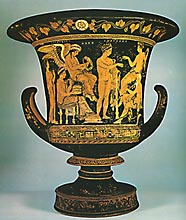Sophocles was born in around 497/96, and died in 406
B.C. He therefore lived through all the events of the 5th century B.C.
A scion of a wealthy aristocratic
Athenian family, he thus had the chance of a broad
education. He held the posts of Hellenotamias
and strategos. In 413, after
the catastrophe in Sicily, he was one of a body of probouloi
appointed to take decisions in order
that the city should be more strictly run. He never left
Athens, except when his posts required it. The adjectives
with which the sources characterize him are staunchly
Athenian or very staunchly Athenian: this
indicates his love for his birthplace. His circle of
friends included all the famous names in art and
politics, Perikles being one of them. |




